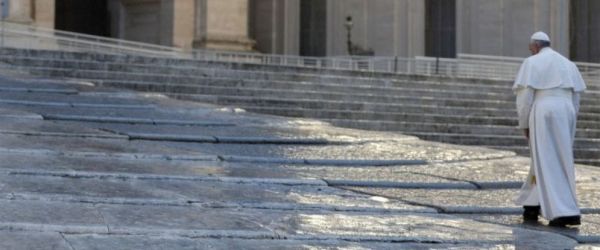The Gospel [...] presents to us the miracle of the multiplication of the loaves (see Mt 14,13-21). The scene takes place in a deserted place, where Jesus had retired with His disciples. But the people found Him so as to listen to Him and to be healed: indeed, His words and His gestures restore and bring hope. At sundown, the crowd was still present and the disciples, practical men, invited Jesus to send them away so that they could go and find something to eat. But He answered: “You give them something to eat” (v. 16). We can imagine the disciples’ faces! Jesus was well aware of what He was about to do, but He wanted to change their attitude: not to say, “send them away,” “let them fend for themselves”, “let them find something to eat”, but rather, “what does Providence offer us to share?” These are two opposite ways of behaving. And Jesus wants to bring them to the second way of behaving because the first proposal is that of the practical person, but is not generous: “send them away so they can go and find, let them fend for themselves.” Jesus thinks another way. Jesus wants to use this situation to educate His friends, both then and now, about God’s logic. And what is God’s logic that we see here? The logic of taking responsibility for others. The logic of not washing one’s hands, the logic of not looking the other way. No. The logic of taking responsibility for others. That “let them fend for themselves” should not enter into the Christian vocabulary.
As soon as one of the Twelve says, realistically, “We have here only five loaves of bread and two fish”, Jesus answers, “Bring them here to me” (vv. 17-18). He takes the food in His hands, raises His eyes heavenward, recites the blessing and begins to break it and give the pieces to the disciples to hand out. And those loaves and fish did not run out; there was enough, and plenty left over for thousands of people.
With this gesture, Jesus demonstrates His power; not in a spectacular way but as a sign of charity, of God the Father’s generosity toward His weary and needy children. He is immersed in the life of His people, He understands their fatigue and their limitations, but He does not allow anyone to be lost, or to lose out: He nourishes them with His word and provides food in plenty for sustenance.
In this Gospel passage we can perceive a reference to the Eucharist, especially in the description of the blessing, the breaking of the bread, delivery to the disciples, and distribution to the people (v. 19). It is noteworthy how close the link is between the Eucharistic bread, nourishment for eternal life, and daily bread, necessary for earthly life. Before offering Himself to the Father as the Bread of salvation, Jesus ensures there is food for those who follow Him and who, in order to be with Him, forgot to make provisions. At times the spiritual and the material are in opposition, but in reality spiritualism, like materialism, is alien to the Bible. It is not biblical language.
The compassion and tenderness that Jesus showed towards the crowds is not sentimentality, but rather the concrete manifestation of the love that cares for the people’s needs. And we are called to approach the Eucharistic table with these same attitudes of Jesus: compassion for the needs of others, this word that is repeated in the Gospel when Jesus sees a problem, an illness or these people without food… “He had compassion.” “He had compassion”. Compassion is not a purely material feeling; true compassion is patire con [to suffer with], to take others’ sorrows on ourselves. Perhaps it would do us good today to ask ourselves: Do I feel compassion when I read news about war, about hunger, about the pandemic? So many things… Do I feel compassion toward those people? Do I feel compassion toward the people who are near to me? Am I capable of suffering with them, or do I look the other way, or “they can fend for themselves”? Let us not forget this word “compassion,” which is trust in the provident love of the Father, and means courageous sharing.
May Mary Most Holy help us to walk the path that the Lord shows us in today's Gospel. It is the journey of fraternity, which is essential in order to face the poverty and suffering of this world, especially in this tragic moment, and which projects us beyond the world itself, because it is a journey that begins with God and returns to God.
[Pope Francis, Angelus 2 August 2020]












